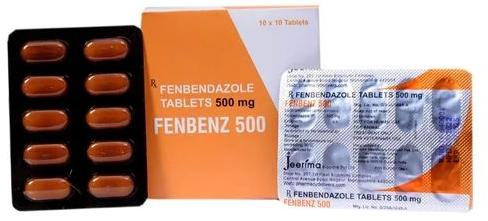fenbendazole capsules: Key Insights for Owners
Wiki Article
Comprehending the Advantages and Uses of Fenbendazole in Vet Medicine
Fenbendazole has actually established itself as an essential anthelmintic in vet medication. Its capability to target different parasitical infections makes it an important device for veterinarians. The medication's system interrupts necessary cellular processes in bloodsuckers, bring about effective therapy outcomes. Its safety and security account varies in between types, demanding cautious consideration in its use (fenbendazole). Comprehending these dynamics can clarify fenbendazole's more comprehensive ramifications in vet care and continuous research into its prospective beyond standard applicationsSystem of Activity of Fenbendazole

Typical Parasitic Infections Dealt With With Fenbendazole
A selection of parasitical infections are successfully treated with fenbendazole, making it a functional alternative in veterinary medicine. This anthelmintic agent is especially effective versus nematodes, consisting of roundworms and hookworms, which frequently impact canines and cats. It is also used for the therapy of cestodes, such as tapeworms, giving a wide range of activity versus both kinds of intestinal parasites. Additionally, fenbendazole is valuable in handling infections triggered by protozoa, especially Giardia, which can bring about intestinal distress in pets. Its efficiency extends to dealing with particular lungworms in canines and felines, resolving breathing health and wellness worries linked to these bloodsuckers. On the whole, fenbendazole's capability to target numerous parasitical types makes it a useful tool in veterinary method, guaranteeing the health and wellness of animals impacted by these usual infections.Safety and Effectiveness in Various Pet Variety
The safety and security and efficacy of fenbendazole vary among different animal varieties, underscoring the relevance of species-specific factors to consider in vet medication. In dogs, fenbendazole is generally well-tolerated and effective against a variety of stomach parasites, including roundworms and hookworms. For felines, however, its usage is much less typical and may call for mindful application as a result of possible adverse reactions.In livestock, such as livestock and sheep, fenbendazole shows performance versus different endoparasites, contributing to enhanced health and wellness and productivity. The pharmacokinetics and prospective side results can differ significantly in between species, demanding careful evaluation by veterinarians.
Equines additionally respond favorably to fenbendazole, particularly for dealing with strongyles and ascarids, though dosage and administration courses should be tailored to their unique physiology. Consequently, recognizing these distinctions is essential for optimizing therapy end results and ensuring animal well-being throughout varied varieties.
Management and Dosage Standards
Proper administration and dose guidelines are crucial for making the most of the therapeutic impacts of fenbendazole while decreasing prospective negative effects. The dosage generally differs depending on the species being treated, the particular condition, and the solution of fenbendazole made use of. fenbendazole capsules. For dogs and pet cats, a common dosage is 50 mg/kg body weight, provided once daily for three successive days, but veterinarians may readjust this based upon specific wellness assessmentsIt is essential to carry out fenbendazole with food to boost absorption and lessen intestinal upset. The drug is readily available in numerous forms, including granules and paste, permitting flexible administration options. Monitoring the pet's feedback throughout and after therapy 222 mg is suggested to verify efficacy and security. Furthermore, veterinary support is essential to figure out the ideal duration of therapy based on the kind of parasitical infection being attended to, guaranteeing optimal end results for the animal's wellness.
Future Perspectives and Research on Fenbendazole
Research study on you could try here fenbendazole remains to advance, concentrating on its possible applications past traditional antiparasitic usages. Recent studies have explored its effectiveness in dealing with numerous forms of cancer cells, particularly in vet oncology. Preliminary data recommend that fenbendazole might inhibit the growth of tumor cells and enhance the impacts of various other chemotherapeutic agents.Moreover, researchers are exploring its duty in taking care of stomach conditions in pets, highlighting its anti-inflammatory residential properties. The adaptability of fenbendazole for various varieties elevates questions about its security accounts and perfect dosing regimens in diverse populations.
As interest expands, there is a need for comprehensive medical tests to develop evidence-based standards for these novel applications. Future research may also examine the mechanisms behind fenbendazole's effects, possibly leading the way for ingenious restorative strategies in veterinary medicine. The recurring expedition of fenbendazole can greatly enhance therapy options for different veterinary conditions.

Frequently Asked Questions
Is Fenbendazole Safe for Pregnant Animals?
The security of fenbendazole for expectant pets continues to be unsure. While some studies suggest marginal risk, veterinarians generally recommend caution and typically discourage its usage while pregnant unless the benefits plainly exceed potential threats.Can Fenbendazole Be Used in Livestock?
Fenbendazole is typically utilized in livestock to treat various parasitical infections. fenbendazole 222. Its efficiency versus intestinal worms makes it a beneficial anthelmintic, adding to improved wellness and performance in pets raised for food and fiberWhat Are the Adverse Effects of Fenbendazole?

The side results of fenbendazole may include intestinal disturbances, lethargy, and allergies. In rare instances, much more extreme reactions could occur, demanding mindful monitoring and consultation with a veterinarian during therapy.
Just How Does Fenbendazole Compare to Various Other Dewormers?
Fenbendazole uses broad-spectrum efficiency against different parasites, often comparing positively to various other dewormers. Its unique system targets various life phases, making it effective, while typically offering a desirable safety and security account compared to choices offered on the market.Can Fenbendazole Be Used for Dealing With Cancer Cells in Pet Dogs?
The potential of fenbendazole in dealing with cancer cells in family pets has amassed rate of interest. Initial researches recommend it might prevent cancer cells cell growth, however additionally research study is required to confirm its effectiveness and security why not check here in veterinary oncology.Report this wiki page